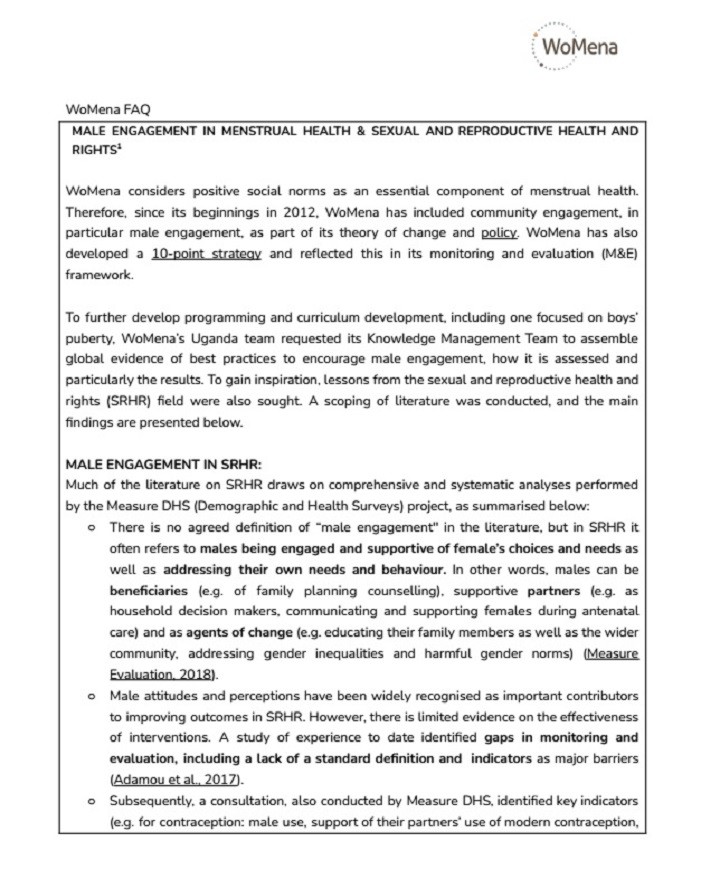How can Males be engaged in Menstrual Health & Sexual and Reproductive Health and Rights? WoMena (2021)
WoMena considers positive social norms as an essential component of menstrual health. Therefore, since its beginnings in 2012, WoMena has included community engagement, in particular male engagement, as part of its theory of change and policy. WoMena has also developed a 10-point strategy and reflected this in its monitoring and evaluation (M&E) framework.
Much of the literature on SRHR draws on comprehensive and systematic analyses performed by the Measure DHS (Demographic and Health Surveys) project, as summarised below:
There is no agreed definition of “male engagement'' in the literature, but in SRHR it often refers to males being engaged and supportive of female’s choices and needs as well as addressing their own needs and behaviour. In other words, males can be beneficiaries (e.g. of family planning counselling), supportive partners (e.g. as household decision makers, communicating and supporting females during antenatal care) and as agents of change (e.g. educating their family members as well as the wider community, addressing gender inequalities and harmful gender norms) (Measure Evaluation, 2018).
Male attitudes and perceptions have been widely recognised as important contributors to improving outcomes in SRHR. However, there is limited evidence on the effectiveness of interventions. A study of experience to date identified gaps in monitoring and evaluation, including a lack of a standard definition and indicators as major barriers (Adamou et al., 2017).
Subsequently, a consultation, also conducted by Measure DHS, identified key indicators (e.g. for contraception: male use, support of their partners’ use of modern contraception, trainers commitment to gender sensitivity and inclusion in national policy) (Measure Evaluation, 2018).
A further study identified 100 indicators used to monitor and evaluate male engagement in family planning (Adamou et al. 2019).
Building on the above, the DHS has identified and validated 15 to 20 key indicators on male engagement (DHS Database).
Greene et al note that programmes to engage males as beneficiaries are the most straightforward to evaluate, those which address males as partners are a little more challenging, and those addressing males as advocates the most difficult (Greene et al., 2006).
The USAID Interagency Gender Group notes that tailoring activities to promote male engagement in health promotion and gender equity can have a positive effect, and has identified do’s and don’ts:
Do: recognise, acknowledge and ensure males needs are addressed; try to transform harmful gender relations and norms; collect sex-disaggregated data to include males; start early in the lifecourse; include and engage males individually and in groups, as well as together with females.
Don’t: involve males at the expense of females; discount the structural barriers faced by males when accessing SRH services; assume that all males are ‘bad actors’; overlook the heterogeneity among men and boys; disregard scale and sustainability to achieve impact (Pulerwitz, 2019).
Videos
Men and boys in menstrual health management
Bibliographic information
WoMena (2021). How can Males be engaged in Menstrual Health & Sexual and Reproductive Health and Rights? WoMena
Filter / Tags
Sustainable WASH in institutions and gender equality (WG7)Behaviour change (WG13)OtherEnglishSexual and Reproductive Health and Rights (SRHR)Menstrual Health and Hygiene (MHH)Boys and Men's Engagement
External links
How can Males be engaged in Menstrual Health & Sexual and Reproductive Health and Rights?
Downloads
How can Males be engaged in Menstrual Health & Sexual and Reproductive Health and Rights?
Type: application/pdf
Size: 0.17 MB

